Regional

Punjab alone collected more than Rs 2,000 crore in food grain purchase tax. UP received Rs 700 Cr....
Digital Desk: Finance Minister Nirmala Sitharaman on Tuesday provided a list of food items that are exempt from GST if sold loose and not pre-packaged or labelled.
Items like pulses/daal, wheat, rye, oats, maize, rice, atta/flour, suji/rawa, besan, puffed rice, and curd/lassi are among them.
In a series of tweets, the minister clarified the new GST rates that came into effect on Monday. The move was taken after Tuesday’s adjournment of Lok Sabha sessions due to opposition demonstrations against rising prices and GST rates.
In her tweets, Sitharaman defended the 5% GST imposed on food items, claiming that the GST Council collectively decided to do so and that all states were present when the topic was brought up by the Group of Ministers on Rate Rationalization on June 28, 2022.
She stated that this is not the first time that such food items have been taxed. In the pre-GST era, food grain was a substantial source of revenue for the states. Punjab alone collected more than Rs 2,000 crore in food grain purchase tax. UP received Rs 700 Cr.
She added that a GST rate of 5% was applied to branded cereals, pulses, and flour when the GST was implemented. Later, this was changed to only tax goods that were sold under registered trademarks or trademarks for which the supplier had not waived an enforceable right.
However, she claimed that respectable manufacturers and brand owners immediately began to widely abuse this clause, which led to a considerable decline in the GST money generated by these goods.
“This was RESENTED by suppliers and industry associations who were paying taxes on branded goods. They wrote to the Govt to impose GST uniformly on all packaged commodities to stop such misuse. This rampant evasion in tax was also observed by States,” Sitharaman said in a tweet.
The minister stated in his letter that the Fitment Committee, which consisted of officers from Gujarat, Rajasthan, West Bengal, Tamil Nadu, Bihar, Uttar Pradesh, Karnataka, and other states, had also looked into this matter over several meetings and had made recommendations for altering the procedures to prevent abuse.
“The GST Council decided at its 47th meeting with this in mind. With effect from July 18, 2022, only the procedures for applying the GST to these commodities were altered; the GST’s coverage remained the same, except for a few items,” she stated.
“It has been stipulated that GST on these goods shall apply when delivered in “pre-packaged and labelled” commodities attracting the Legal Metrology Act’s provisions,” she said.
Leave A Comment